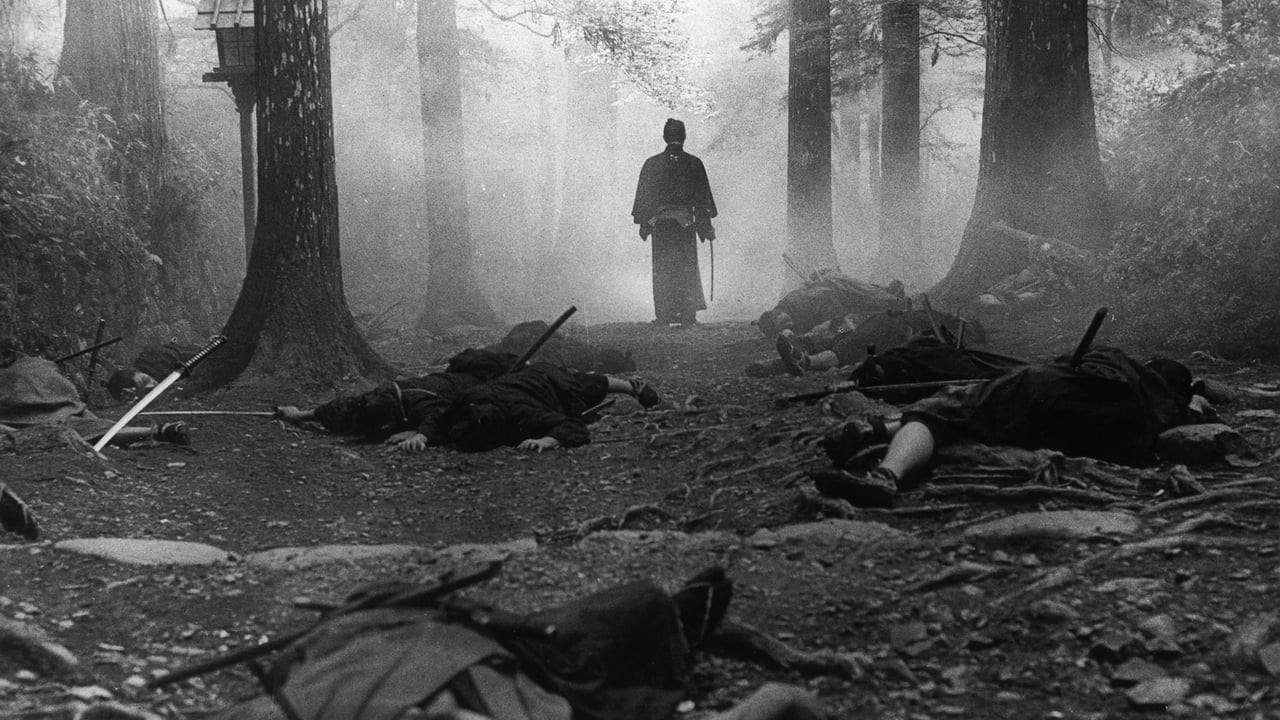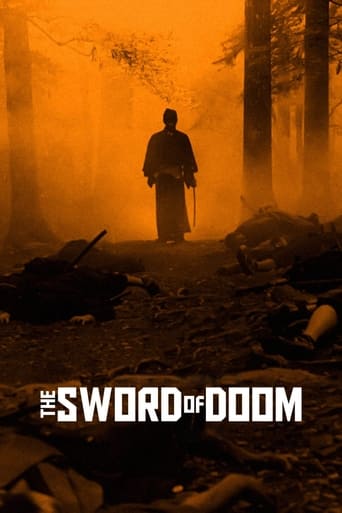

The movie turns out to be a little better than the average. Starting from a romantic formula often seen in the cinema, it ends in the most predictable (and somewhat bland) way.
... View MoreEasily the biggest piece of Right wing non sense propaganda I ever saw.
... View MoreGreat story, amazing characters, superb action, enthralling cinematography. Yes, this is something I am glad I spent money on.
... View MoreIt is neither dumb nor smart enough to be fun, and spends way too much time with its boring human characters.
... View MoreFor various reasons, some movies are immediately pleasing while others take their time to grab you (or perhaps you take your time to become receptive to their charms). Occasionally a film combines the two effects and Sword of Doom is one of these: It has this quality of being immediately entertaining and yet it retains or withholds so much detail that you need to watch several times to comprehend every nuance.It's not that it works "on many levels", though you could approach it that way. Rather, Sword Of Doom simply has lots of unexplained back story, some of it historical, and the back story is so interesting that, if you wish, your enjoyment can be as much about understanding the back story as it is about the film and the performances.It's an adult approach to entertainment: A complicated narrative made simple and entertaining by leaving a lot of detail to your imagination or further research.I've watched it a few times now and am looking forward to watching it a lot more. Each time I do so I'll probably check a few IMDb postings and wikipedia pages to get a new angle on the film and to learn a bit more detail on the period. As a first time watch I probably rated it 8 or 9/10 but as I keep watching it it makes a 10.
... View MoreHere, in one of Nakadai's best performances, he plays a young, seemingly evil Samurai who lives by his own moral code. He ruthlessly slays anyone who he thinks should die, and it's hard to say whether his killings are unjust or deserved, even though his actions might seem despicable at first. For example, in the beginning of the film, he encounters an ageing pilgrim praying for a quick death. Upon hearing this, Nadakai's character kills him in one swift move. This scene sets the tone for the rest of the movie. Nakadai's fighting style echo's his attitude to an extent, it's an ultra defensive style in which he never strikes the first blow. In an iconic scene later on in the film, Mifune's older and wiser samurai tells Nakadai, "The sword is the soul. Study the soul to know the sword. Evil mind, evil sword." In Japanese culture, the sword and style of a samurai could be seen as a window to his soul and "Sword of Doom" beautifully yet brutally echoes this sentiment. In the penultimate scene of the film, Nakadai's samurai is haunted by his past actions and starts to hallucinate, he is clearly a broken man and regrets some of his actions. The ending of the film is surely a controversial one but I personally loved it. Nothing is resolved, apparently there were sequels planned but they never came to light for one reason or another. Nevertheless, it didn't take away anything from the film and for me it actually added to the mystique and moral ambiguity of Nakadai's character. Impeccably shot and beautifully choreographed, the film is a feast for the eyes. Nakadai's performance as a self destructive samurai was highly intense and full of emotion, his shift in character alone was astonishing and really displayed Nakadai's talent as a versatile actor. Mifune is also in the film and has his fair share of excellent scenes and lines. In summary, an excellent film that I'd recommend to anyone with a remote interest in Samurai movies.
... View MoreMost of the comments have focused on direction. I'm more interested in the acting. Naturally, that is a function of how the director shapes performances on the set and in the editing suite, but the director has to have something to work with.Tatsuya Nakadai has, for his long career as a performer and teacher, a justifiably great reputation. But there's an arc to his development as an actor that has him starting out by chewing scenery as a younger performer and gradually becoming a decent, and then sublime, actor.Sometimes in his early performances a director was able to rein in and/or harness Nakadai's excesses to good effect. For instance, I don't think Kurosawa brought him under control at all in "Sanjuro," but managed to make the best of his hamminess in "Yojimbo," largely by having him channel Elvis Presley's swagger and sneer.The situation is similar in "Sword of Doom," except in this case Nakadai is channeling James Dean's brooding intensity, but with not nearly the subtlety James Dean was famous for. That sort of subtlety comes a lot later in Nakadai's career, most notably in "Kagemusha," when Kurosawa, or Nakadai himself, found his volume knob and turned it down. We don't realize how fortunate we were to have Dean in full-blown genius mode from the beginning. He was a preternaturally old soul. Nakadai just had to age the normal way in order to uncover that inner core that makes a screen performance transcendent.
... View MoreWhat an amazing movie! I got this expecting an action packed samurai movie - what I wasn't expecting is for it to be so intense, so fascinating in its exploration of notions of karma. This is one movie that I'd strongly recommend anyone to read up the discussions here - there are some very interesting contributions about the background to the movie, otherwise much of it will be inexplicable to the casual western viewer.Kihachi Okamoto is not a director whose movies I'd seen before, but apparently he worked with many of the greats from the 1940's onwards. He certainly had an amazing, if very dark vision. This movie is superbly directed, with great pacing, beautifully filmed settings and some staggeringly good action scenes that rank amongst the very best I've ever seen. The story is in many ways unexpected and confusing - this is at least partly due to it being part of a series that was never (sadly) completed. But also it seems that Okamoto's intention was not to produce a simple good vs. bad movie with a satisfying ending. Instead he is much more interested in Buddhist notions of karma and how bad karma infects all around it, dragging people literally into hell (or at least this is my interpretation of that very puzzling, but also memorable ending).So long as you don't expect the movie to follow a traditional and predictable story arc, I'd strongly recommend it. The directors vision is dark and violent, but it is brilliantly realised. You will not forget Tatsuya Nakadai's disturbed and evil swordsman in a long time and the action sequences are dazzling.
... View More